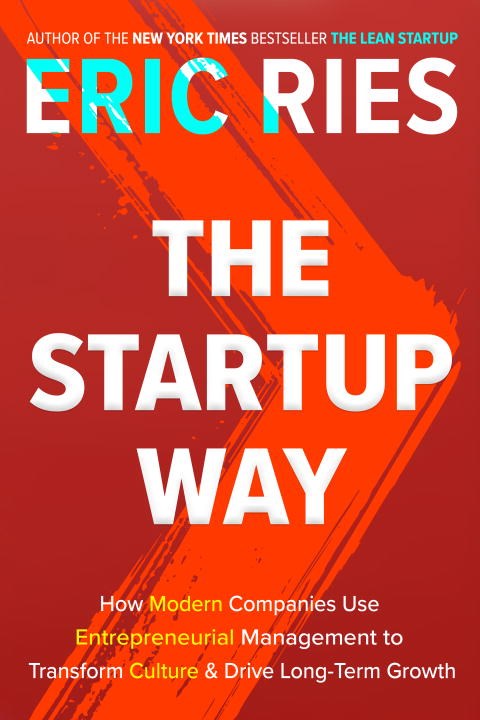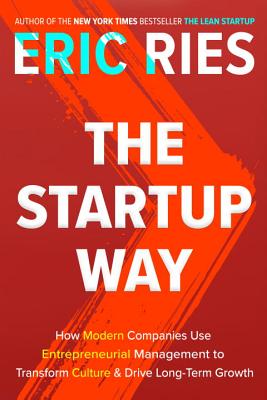The Startup Way: How Modern Companies Use Entrepreneurial Management to Transform Culture and Drive Long-Term Growth
October 20, 2017
Eric Ries has written both a philosophical treatise for a new form of management and an entrepreneurial engineering guide to doing the work on the ground.

The Startup Way: How Modern Companies Use Entrepreneurial Management to Transform Culture and Drive Long-Term Growth by Eric Ries, Crown Business, 400 pages, Hardcover, October 2017, ISBN 9781101903209
Picture a stereotypical tech geek teen toiling away in his parent’s basement. He coauthors his first book, on Java and game development, before he turns twenty. He trains as a software engineer, moves to Silicon Valley, and starts a company. But the technical problem he really yearns to solve is a human one. He is more interested in the management of people and processes than the manipulation of code. He sees the startup as a human institution. It was that institution he put his engineering mind to, and he begins “to formulate a model for how to make the practice of entrepreneurship more rigorous.” That person is Eric Ries, and that path led the breakout success of his first book, The Lean Startup, which has sold over a million copies and been implemented in companies all over the globe. It has been used in countless startups, but also on large multinational corporations like Toyota and GE—even in the United States government. Ries now travels the world, often advising some of world’s largest companies in the morning, and tiny startups that could become the word’s largest in ten years, in the afternoon.
If you follow this column, you know I am incredibly skeptical of the Silicon Valley ethos of disruption, but there’s no denying the reality of that disruption, or the success that has emerged from it. The five largest companies in the world are now tech companies, and three of them are literally located in the Valley. There is a lot the rest of the world can learn from the mindset, focus, financial structure, ways in which risk is accounted for, taken, managed, and rewarded there—and a lot it can adapt. Eric Ries’ new book, The Startup Way, explains all of that, and how to do it.
It sounds like a tall task, but The Startup Way is up to it. It is both a philosophical treatise and an entrepreneurial engineering guide to doing the work on the ground.
There are five key principles behind the Startup Way philosophy: Continuous Innovaton, Startup as Atomic Unit of Work, The Missing Function, The Second Founding, and Continuous Transformation. Those principles do not make up the chapters or sections of the book as you might expect from a typical business book, but are woven throughout and within. Instead, the book is broken into three parts: the first detailing how he believes a modern company should function, the second a road map for transformation to get there, and the third pulling back to look at the bigger picture we all face as a society.
With regard to how a truly modern company should function, he believes there is currently a missing function in established enterprises, “the entrepreneurial function.” Ries suggests it should be considered on par with the engineering, sales and marketing, HR, IT, and finance functions of an organization. He asks us to imagine what companies were like before marketing was a recognized function and discipline in business, and suggests that is where we are at in large organizations with regards to entrepreneurship—that is, most companies lack a dedicated team devoted to exploring new, potentially high-growth initiatives, integrating them within the larger organization if and when they begin to succeed, and “infusing everyday work across the organization with an entrepreneurial, experimental, iterative mindset.”
Entrepreneurship, as Ries sees it, is a skill, one that can be trained and that needs to be invested in. And if you don’t think your organization has the capacity to do so, that it’s too underfunded and understaffed, or too traditional and set in its ways, let me refer you to the chapter on the “Lessons from the Lean Startup” and a story of the Department of Education’s College Scorecard team. Or the story of how HealthCare.gov, a website that was initially an abject failure born of the most obscene conventional bureaucratic processes, was turned around and resurrected by a small team of technologists working on the entrepreneurial principles of rapid iteration, validated learning, and accountability. The story reflects a lesson Ries has learned while surveying the organizational landscape:
I have come to realize that today’s organizations—both established and emerging—are missing three capabilities that are needed for every organization to thrive in the century ahead: the ability to experiment rapidly with new products and new business models, the ability to empower their most creative people, and the ability to engage again and again in an innovation process—and manage it with rigor and accountability—so that they can unlock new sources of growth and productivity.
The thing I appreciate most about Ries, though, is that he doesn’t turn up his nose at other methodologies or management practices, and he doesn’t pretend that his is the “be-all, end-all management system.” He’s clearly well read on the history of economics and management, and pays respect to those whose shoulders he’s standing on, going back even to Alfred P. Sloane’s classic book, My Years with General Motors, and the beginning of forecasting in business. The name of the book itself is an homage to Jeffrey Liker’s Toyota Way, which Ries describes as “magisterial.” And he also reviews the major conclusions of his first book, The Lean Startup, explaining the concepts and practice of leap-of-faith assumptions, a minimal viable product (or MVP), validated learning, and the build-measure-learn feedback loop. The point of his book isn’t that all the old ways are bad, but that, in fact, their successes have changed the world, but were themselves not the “be-all, end-all management system.” Speaking of the quality revolution in manufacturing, he writes:
Understanding how to build quality into products from the inside out required mastering the new statistical science of variation, and then devising tools, methodologies, and training programs that could make this practical. Standardization, mass production, lean manufacturing, and Six Sigma are all fruits of this hard-won conceptual victory.
And yet, to paraphrase a point made by a senior executive at Toyota the first time he met with Ries, we have become very good at manufacturing high quality, reliable products, but that focus on quality control and perfecting our existing products or services (as well as processes), sometimes causes us to lose the capacity for capturing new ideas, and the ability to build something new. And without that innovative spirit and ability, companies stagnate. Ries believes:
A modern company is one that has both halves, both systems. It has the capacity to produce products with great reliability and quality, but also to discover what new products to produce.
The latter ability has largely been the province of startups and entrepreneurs, but it doesn’t have to be. Ries advocates for companies to implement internal startup teams, a small group dedicated to a single project that is “able to experiment rapidly and scale their impact.” That said, it doesn’t mean the process of trying something new should not be as rigorous or defined, or held to the same standard of accountability, as that for perfecting the quality of existing products. Startups are inherently harder to predict or forecast for. (The thing that struck Ries upon reading My Years with General Motors wasn’t that forecasting, “the basis of twentieth-century general management,” didn’t really exist before Sloan, but that it actually ever worked—that people made forecasts and they actually came true. As an entrepreneur in Silicon Valley, where forecasts are “just made up”—more a ritual one goes through to get funding rather than an accurate prediction—he found it baffling that they could not only be accurate, but that entire management systems, who got promoted, and which projects were green lighted, depended on them. By their very nature, because they are untested, startups are generally impossible to forecast. And yet, “Even in situations where you can’t forecast,” Ries insists that “you can still plan.” The Startup Way provides that plan.
The end goal of this process is to create a true synthesis: a new, modern way of thinking about organizations and leadership that can become the basis for twenty-first-century growth and innovation. In service to this goal, it would be crazy to throw away the hard-won managerial lessons of the past. It would be even crazier to allow ourselves to be trapped in rote conformance to past ideology in the face of change and disruption. Instead, it’s time to start building on them.
And once you start, it begins a process of continuous transformation, the final principle of the Startup Way philosophy. And here’s the thing about that: the entire economy, the whole world, is in a state of continuous transformation. Speaking of how global communications and production technologies have lowered the barrier to entry to business, he writes:
This setup flips Karl Marx’s old dictum on its head; what he called the means of production can now be rented. Entire global supply chains can be borrowed at little more than the marginal cost of the underlying products they produce. This dramatically lowers the initial capital costs required to try something new.
So, in the final section he pulls out to the bigger picture. He introduces a unified theory of entrepreneurship, where he squares the circles of startup entrepreneurship and corporate entrepreneurship—identifying them, as he does throughout the book, as essentially the same discipline. He’ll explain why, as a citizen of the world, he’s confident a more “entrepreneurial ecosystem will flourish,” even if, as an American citizen, he is worried that we’re losing our leadership in creating it. He discusses the future of healthcare, the future of unions, universal basic income, executive compensation, and an entirely new MVP—a Minimum Viable Politics.
The world has changed. How we manage it must change, as well. The Startup Way is not the end of management, because nothing ever is, but Eric Ries has some great ideas for the next step, born of the place that is doing the most to change it.


